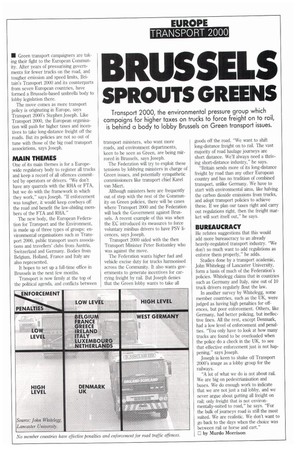BRUSSELS
Page 32

If you've noticed an error in this article please click here to report it so we can fix it.
SPROUTS GREENS
Transport 2000, the environmental pressure group which campaigns for higher taxes on trucks to force freight on to rail, is behind a body to lobby Brussels on Green transport issues.
• Green transport campaigners are taking their fight to the European Community. After years of pressurising governments for fewer trucks on the road, and tougher emission and speed limits, Britain's Transport 2000 and its counterparts from seven European countries, have formed a Brussels-based umbrella body to lobby legislation there.
The move comes as more transport policy is originating in Europe, says Transport 2000's Stephen Joseph. Like Transport 2000, the European organisation will push for higher taxes and incentives to take long-distance freight off the roads. But its policies are not so out of tune with those of the big road transport associations, says Joseph.
MAIN THEMES
One of its main themes is for a Europewide regulatory body to register all trucks and keep a record of all offences committed by operators or drivers. "We don't have any quarrels with the RHA or PTA, but we do with the framework in which they work," says Joseph. "If enforcement was tougher, it would keep cowboys off the road and benefit the law-abiding members of the ETA and RHA."
The new body, the European Federation for Transport and the Environment, is made up of three types of groups: environmental organisations such as Transport 2000, public transport users associations and travellers' clubs from Austria, Switzerland and Germany. Bodies from Belgium, Holland, France and Italy are also represented.
It hopes to set up a full-time office in Brussels in the next few months.
Transport is now firmly at the top of the political agenda, and conflicts between transport ministers, who want more roads, and environment departments, keen to be seen as Green, are being mirrored in Brussels, says Joseph.
The Federation will try to exploit these tensions by lobbying ministers in charge of Green issues, and potentially sympathetic commissioners like transport chief Karel van Miert.
Although ministers here are frequently out of step with the rest of the Community on Green policies, there will be cases where Transport 2000 and the Federation will back the Government against Brussels. A recent example of this was when the EC introduced its measures to force voluntary minibus drivers to have PSV licences, says Joseph.
Transport 2000 sided with the then Transport Minister Peter Bottomley who was against the move.
The Federation wants higher fuel and vehicle excise duty for trucks harmonised across the Community. It also wants governments to generate incentives for carrying freight by rail. But Joseph denies that the Green lobby wants to take all goods off the road. "We want to shift long-distance freight on to rail. The vast majority of road haulage journeys are short distance. We'll always need a thriving short-distance industry," he says.
"Britain sends more of its long-distance freight by road than any other European country and has no tradition of combined transport, unlike Germany. We have to start with environmental aims, like halving the carbon dioxide emissions from trucks, and adopt transport policies to achieve these. If we plan our taxes right and carry out regulations right, then the freight market will sort itself out," he says.
BUREAUCRACY
He refutes suggestions that this would add more bureaucracy to an already heavily-regulated transport industry. "We don't so much want to add regulations as enforce them properly," he adds.
Studies done by a transport academic, John Whitelegg of Lancaster University, form a basis of much of the Federation's policies. Whitelegg claims that in countries such as Germany and Italy, nine out of 10 truck drivers regularly flout the law.
In another survey by Whitelegg, some member countries, such as the UK, were judged as having high penalties for offences, but poor enforcement. Others, like Germany, had better policing, but ineffective fines. All the rest, except Denmark, had a low level of enforcement and penalties. "You only have to look at how many trucks are found to be overloaded when the police do a check in the UK, to see that effective enforcement just is not happening," says Joseph.
Joseph is keen to shake off Transport 2000's image as a lobby group for the railways.
"A lot of what we do is not about rail. We are big on pedestrianisation and buses. We do enough work to indicate that we are not just a rail lobby, and we never argue about gutting all freight on rail; only freight that is not environmentally-suited to road," he says. "For the bulk of journeys road is still the most suited. We are realistic. We don't want to go back to the days when the choice was between rail or horse and cart."
E by Murdo Morrison














































































































